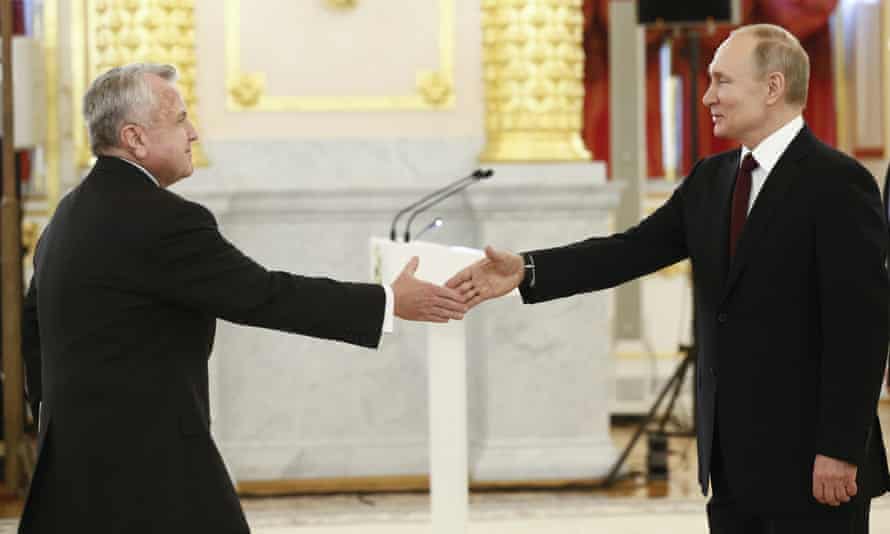Advertisement
begin quote from:
US ambassador to leave Moscow as tensions rise
John Sullivan’s departure will leave both countries’ embassies without their top diplomats at key moment

Washington’s ambassador to Moscow has announced that he will return to the US for consultations, days after the Russian government recommended he leave the country during what it said was an “extremely tense situation”.
John Sullivan’s departure will leave both countries’ embassies without their top diplomats at a crucial moment, with Washington and Moscow recently announcing new sanctions, a Russian military buildup near Ukraine, and concerns about the opposition leader Alexei Navalny’s health while in detention.
“I believe it is important for me to speak directly with my new colleagues in the Biden administration in Washington about the current state of bilateral relations between the United States and Russia,” Sullivan said on Tuesday.
“Also, I have not seen my family in well over a year, and that is another important reason for me to return home for a visit. I will return to Moscow in the coming weeks before any meeting between presidents Biden and Putin.”
Joe Biden and Vladimir Putin discussed a possible summit last week, but the Kremlin has said it would take time to organise and would be “impossible” to hold in the coming weeks.
Russia recalled its ambassador to Washington, Anatoly Antonov, for consultations in March after Biden agreed with a television journalist that Putin was “a killer” and said Putin would “pay a price” for its alleged interference during the 2020 elections.
The Kremlin spokesman, Dmitry Peskov, did not give a firm deadline for the ambassadors to return to their postings. “The return of the ambassadors after consultations in their capitals will depend, first and foremost, on the presence of reasons for that,” he told journalists.
The Biden administration expelled 10 Russian diplomats last week and announced sweeping sanctions against Russia for its alleged elections interference and role in the SolarWinds supply-chain hack. It was the largest expulsion of Russian diplomats since the 2018 Salisbury poisonings.
Russia in response expelled 10 US diplomats and targeted US embassy operations, also recommending the ambassador leave the country.
“It is obvious that the extremely tense situation currently implies an objective need for the ambassadors of both our countries to be in their capitals to analyse the situation and hold consultations,” the foreign ministry wrote in an announcement of its counter-sanctions last week.
Ned Price, the state department spokesman, said that it had not heard from Moscow about the expulsion of US diplomats.
“We have seen those reports, but we haven’t seen any official communication from Moscow,” Price said.
Fiona Hill, who was the senior director for Europe and Russia in the Trump administration’s national security council, said escalating diplomatic tensions served Putin’s interests.
“This is completely inevitable. I don’t think Putin can afford to back down. Biden just wants to move on and revamp the transatlantic relationship and Putin is just not going to let himself be ignored and trivialised,” she said.
“Because of the domestic situation, Navalny, the precariousness around the neighbourhood, Covid, and the problem of how does he keep himself in power, he can’t afford to show any weakness.”
Russia has also been involved in diplomatic rows with other European countries in the last month as relations between Moscow and the west have grown more strained. On Tuesday, Russia expelled two Bulgarian diplomats in a tit-for-tat retaliation to spying allegations dating back to March.
Russia and Poland also expelled a handful of each other’s envoys last week. On Sunday the Czech Republic accused Russian military intelligence of setting a blast at an ammunition depot in 2014 and expelled 18 Russian diplomats. Moscow responded by expelling 20 Czech diplomats, paralysing the much smaller Czech embassy.
On Tuesday, the Bellingcat investigative collective along with Russian and Czech media outlets revealed that six GRU agents, including the leader of a Russian unit tasked with carrying out sabotage and poisonings in Europe, had travelled to the Czech Republic shortly before the blast.
While Sullivan was not expelled from Moscow, it appears that Russian government pressure influenced his decision to leave the country temporarily. The last US ambassador to be expelled from the country was George F Kennan, who was declared persona-non-grata by the Soviet Union under Stalin in 1952.
The US news website Axios earlier reported that Sullivan had previously intended to stay in Moscow, citing two sources briefed on the situation.


No comments:
Post a Comment